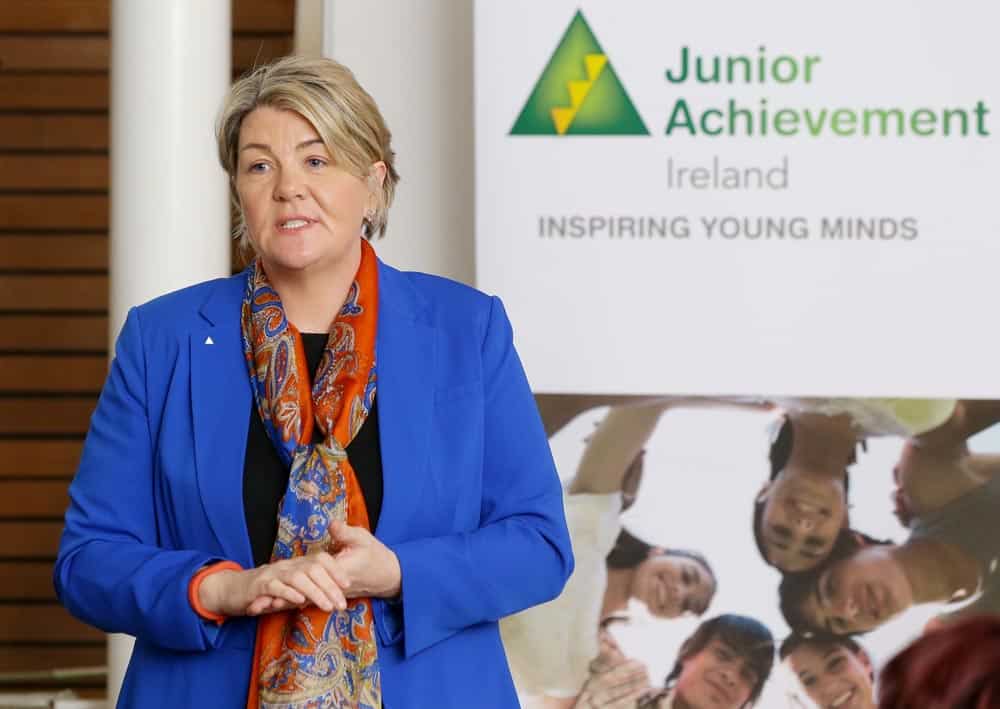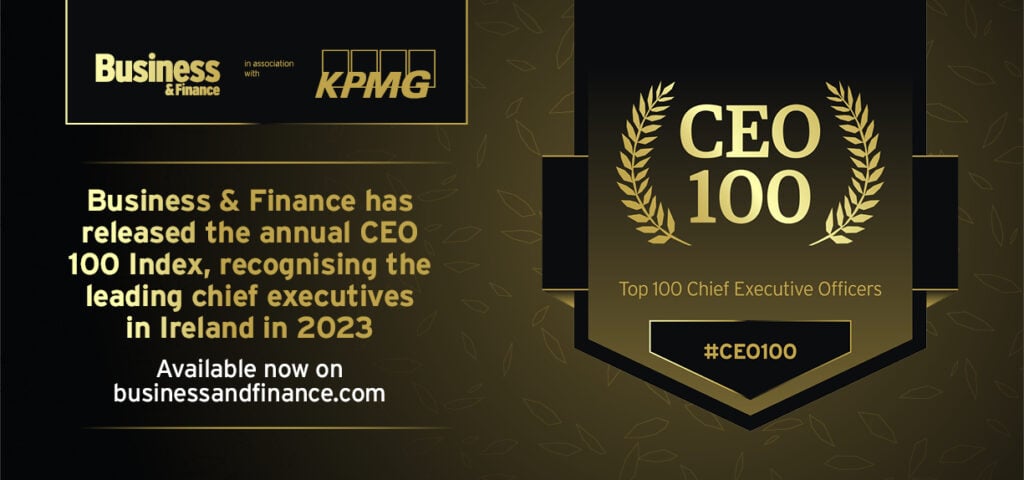CEO of Junior Achievement Ireland Helen Raftery speaks to Business & Finance.
Q. What are your main priorities and goals in your role?
My main priorities are creating partnerships with new supporting organisations, developing and strengthening strategic collaborations with organisations with which we share common aims, and networking and profile-building.
Operating as a non-profit Junior Achievement Ireland (JAI) must build and maintain the trust of partners in industry and education so that our 30 staff can recruit, vet, train, equip and support 3,000 business volunteers to deliver hands-on learning experiences, empowering more than 60,000 students a year to make connections between what they learn in school and the ‘real world’.
Q. How do you define success and what drives you to succeed?
Today’s most in-demand jobs didn’t exist ten years ago. We must aim to give as many students as possible access to role models from the world of work so that they come to understand how they will succeed in tomorrow’s careers, solve tomorrow’s challenges and launch businesses that create tomorrow’s jobs. Our success therefore, is probably defined by the achievements of others.
Q. Explain what ‘financial literacy’ means to you.
Financial literacy is the ability to manage money wisely, to be aware of risk in order to protect one’s personal finances and to know how to use credit prudently. I see it as a life skill that young people need the chance to develop and it’s why we promote skills development in budgeting, saving and investing as core components of our programmes.
Q. How has your strategy developed as you mature?
‘Trust the process!’ was a phrase used repeatedly by a mentor with whom I worked previously, and it is among the most important lessons I ever learned and one that I now apply constantly.
Having worked with about 100 organisations at this juncture, I am convinced that if the right process is designed and followed, then the stages involved in developing and planning to implement a campaign will result in the desired returns.
Q. What would you regard as your greatest achievement to date?
Having joined four years ago, I am honoured to be at the helm as we celebrate our 20th anniversary. Since my appointment I have worked to gain and maintain the trust of the dedicated team working for JAI. Most joined having volunteered to deliver JA programmes in schools.
The belief in the importance of our mission and their willingness to do everything within their power to provide as many opportunities as possible for students to work with business volunteers is a common feature. To reciprocate their dedication and professionalism, it is very satisfying to see staff pursue their own career development plans and avail of flexible working time, family-friendly work practices, sign up for courses and/ or develop new expertise in line with their ambitions and the organisation’s needs.
Q. Do you have new goals and objectives for the coming years?
As agreed with our board, I am determined that the great work being done by our volunteers up and down the country should become more widely known. My focus as CEO is to build the JAI brand so that more and more supporters join our efforts enabling us to meet growth targets. 60,000 students is about 7% of the school-going population.
My goal is for our teams to be able to recruit, train, support and equip enough volunteers to reach 20%, while continuing to prioritise those students most in need of access to inspirational role models.
Q. What’s the best advice you’ve been given, or would give, in business?
Circumstances alter cases.
Q. What have been your highlights over the last year?
There are highlights every week – practically every day. I love seeing the transformation in students as they gain the knowledge and confidence they need to succeed in school, business and life. It is not unusual to encounter volunteers who have changed as a result of their JA experience.
Recently at an in-company event to thank volunteers, a woman introduced herself as a very reluctant volunteer who had ‘successfully avoided’ JA programmes for years. She had convinced herself some time ago that her abhorrence of public speaking meant it was impossible.
Eventually, she was unable to resist the combined forces of her in-company CSR leader, the local JAI staff member and the fact that there was an outstanding programme request from her grandchild’s school that needed to be filled.
She continued her story by letting us know that she had enjoyed herself so much she had signed up again for next year and she was now freely admitting that she had been an idiot to hold herself back from volunteering because of her self-diagnosed lack of public speaking skills.
Since her JA programme she had become a very vocal and proactive member of the company’s community committee to encourage as many people in her situation as possible to overcome their fears and take up the very rewarding volunteering options on offer.
Q. What are the challenges facing entrepreneurship education going forward?
I think we still have work to do to move from a narrow definition of entrepreneurship education, whereby it is linked to venture creation, to a broader understanding where entrepreneurship education is seen as giving our young people the ability to think positively, to look for opportunities to make things happen, to have the self-confidence to achieve their goals, and to use their talents to build a better society (economically and socially).
Entrepreneurship in an educational context therefore should be framed as a key competence for life.
There is a growing body of international evidence, which demonstrates that students who receive entrepreneurship education as part of their schooling show improved academic performance, school attendance, and educational attainment, have increased problem-solving and decision-making abilities, have improved interpersonal relationships, teamwork, money management, and public speaking skills, are more likely to find employment, and have enhanced social psychological development (self-esteem, ego development, self-efficacy).
In recent years the value of broad-based entrepreneurship education has been extensively referenced in policy statements and action plans including calls to ‘make entrepreneurship an integral part of our ambition as a nation’ (Department of Jobs, Enterprise and Innovation, 2014) and as one answer to demand for transversal skills as described in the National Skills Strategy 2025 (Dept. Education & Skills, 2016).
I believe we are ideally positioned to support and enhance how entrepreneurship is experienced by students by ensuring more trained business volunteers are available to complement the work of teachers in inspiring the next generation. .
Entrepreneurship education must seek to prepare people to be responsible, enterprising individuals who have the skills, knowledge and attitudes needed to achieve the goals they set for themselves.
Financial literacy is the ability to manage money wisely, to be aware of risk in order to protect one’s personal finances and to know how to use credit prudently







